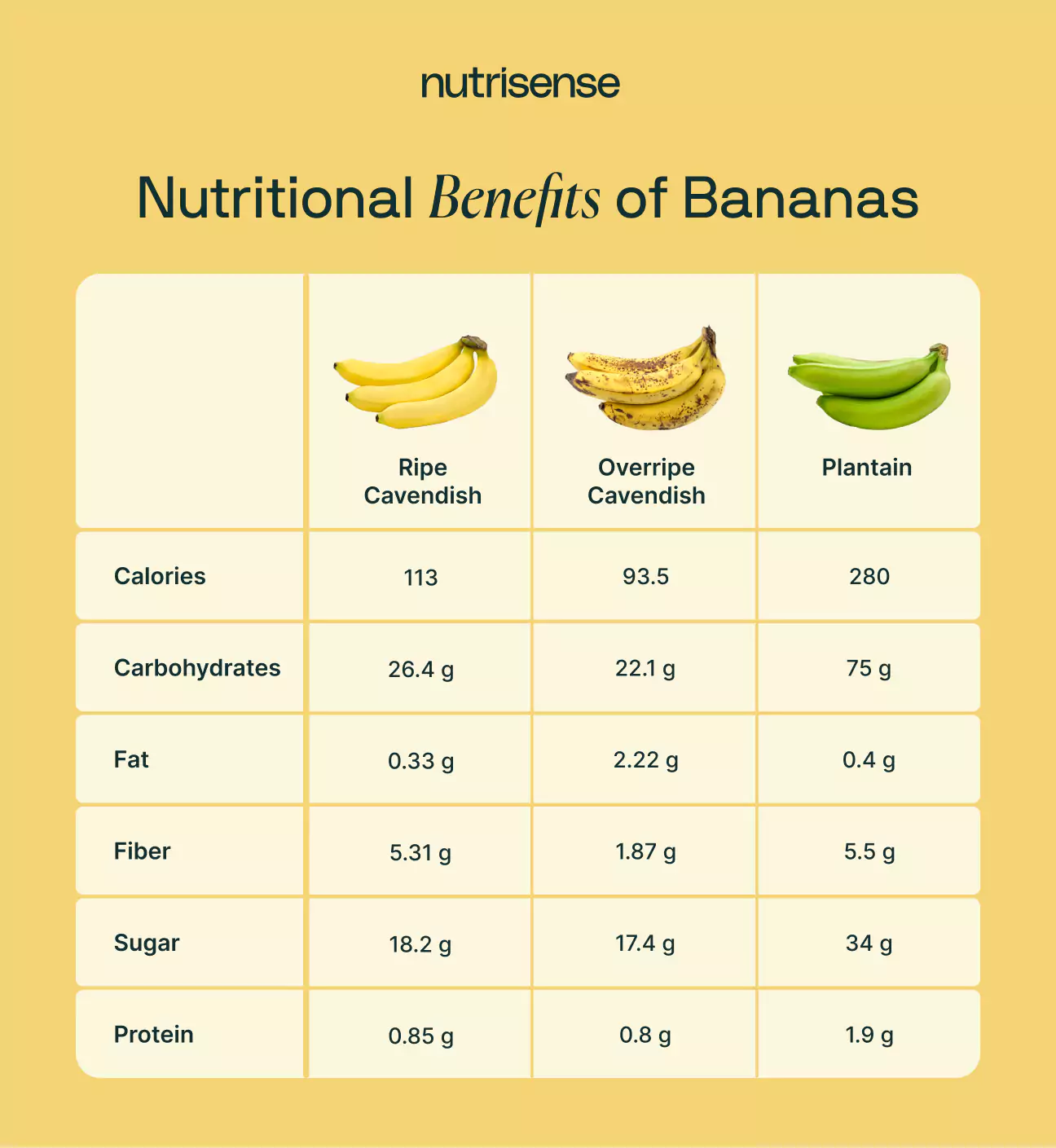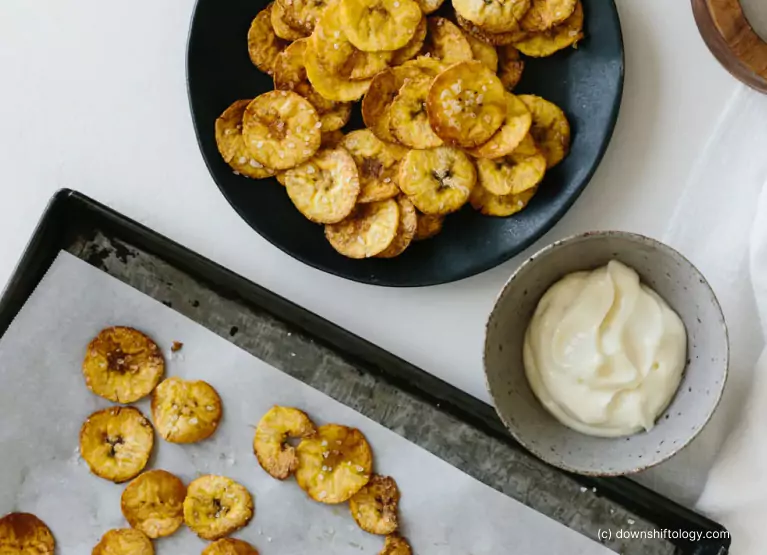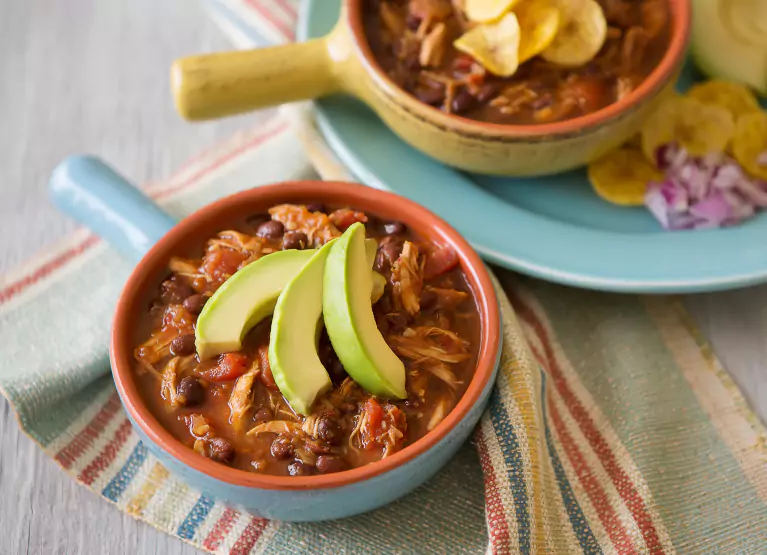The Glycemic Index of Bananas: Analyzing the Impact on Blood Sugar

Key Takeaways
A nutrient-dense, low-calorie tropical fruit, bananas are pretty versatile! They can be eaten raw, fried, baked, added to desserts, or mixed with baked goods and smoothies.
The tasty fruit is thought to have first been cultivated in Southeast Asia and introduced to the Americas in the 14th century. Surprisingly, for one of the most consumed fruits in the United States, bananas only became common here in the 19th century.
While they’re pretty healthy overall, there are hundreds of varieties, each varying slightly in their nutritional profile depending on their ripeness and where they are grown. So, what are the nutritional benefits of bananas? Do they have too much sugar? Can people with diabetes eat them safely? And how might bananas affect your blood sugar even if you don’t have diabetes or blood glucose issues? Read on as our experts break it down.
Types of Bananas
There are many varieties of bananas, but Cavendish bananas are the typical sweet, yellow bananas you find in U.S. grocery stores. Other common banana varieties include red bananas, blue java bananas (also known as Musa acuminata), and apple bananas.
Plantains tend to be thicker and starchier than Cavendish bananas, and aren't usually eaten raw—they’re cooked and often used in savory dishes. Most of the world's plantain production comes from Africa.
Apart from the variety, the level of ripeness can also affect nutritional content. When bananas are unripe, they contain more fiber and resistant starch than ripe, yellow bananas.
Green bananas are also firmer and can have a grassy, bitter taste to them. As they ripen, bananas turn yellow, and their sugar content tends to increase. Overripe bananas, which become spotty and turn darker yellow or brown, are the sweetest.
The Nutritional Benefits of Bananas
The Dietary Guidelines for Americans recommends eating 1.5 to 2.5 cups of fruit daily as part of a healthy diet. Fruits are great sources of nutrients like dietary carbohydrates, fiber, vitamins, potassium, and antioxidants.
These nutrients have a wide range of potential health benefits, including the support of heart health, immune system health, and digestive health. They also help prevent chronic diseases, prevent weight gain, reduce insulin resistance and support blood sugar control, and improve overall well-being.
Here's a look at some of the nutritional benefits of medium-sized ripe bananas, overripe bananas (darker yellow or spotted brown), and plantains.
Some also consider it a superfood because of all the nutrients packed into it. These fruits are a good source of vitamins and minerals like vitamin B6, vitamin C, potassium, and manganese.

Vitamin B6
Bananas contain vitamin B6, a vitamin that plays a role in cognitive development, immune function, and metabolism. Some studies suggest that adequate intake of vitamin B6 may play a role in preventing some types of cancer. However, more research is still needed to confirm this link.
Low levels of vitamin B6 have been associated with depression and cognitive functioning. Studies also show that low vitamin B6 levels can greatly increase the risk of cardiovascular disease.
Fiber
Bananas are a good source of dietary fiber, a carbohydrate found mainly in plant foods. Eating plenty of fiber can positively affect your health, with benefits such as supporting bowel health and reducing your risk of colorectal cancer.
A diet high in fiber can also reduce the risk of heart disease and support healthy blood sugar levels. Researchers have found that only five percent of Americans currently get enough fiber in their diet.
Potassium

Bananas are a good source of potassium, a mineral that your body relies on for kidney, heart, and nervous system function. Potassium intake may also counter the effects of sodium on your blood pressure and is associated with a lower risk of stroke and all-cause mortality.
If you take an ACE inhibitor to treat high blood pressure, the extra potassium in bananas may lead to a dangerously high potassium level in the body. Talk to your doctor to see if bananas and other potassium-containing foods are safe to eat.
Vitamin C
Vitamin C supports immune system function and is required for the production of collagen, a crucial component of the connective tissue important for wound healing. A ripe banana contains 12.5 milligrams of vitamin C.
Vitamin C is also an antioxidant, which means it helps to fight off free radicals in your body. Free radicals, which are molecules that can damage your cells and DNA, may increase the risk of cancer, heart disease, and other diseases.
Vitamin C may also play a role in regulating blood sugar. A 2019 study found that vitamin C may significantly decrease post-meal blood glucose levels.
Manganese

Bananas are also a source of manganese, a trace mineral that is involved in bone formation, reproduction, immune system response, and blood clotting. Manganese also has antioxidant action.
Deficiency in this mineral may increase the risk of type 2 diabetes and bone problems. The recommended daily intake of manganese is 1.8 milligrams for women and 2.3 milligrams for men. One banana contains 0.26 milligrams of this mineral.
Resistant Starch
Unripe bananas and plantains contain resistant starch, which is a type of starch that isn't digested by the body. This compound works similarly to fiber and may lead to improved bowel health, glycemic load values, and insulin response.
It may also have health benefits including helping to lower cholesterol and increasing fullness after meals (which has been observed in overweight men).
Bananas and Blood Glucose

One ripe, medium-sized banana contains about 18 grams of sugar and 26 grams of carbs. While it's possible for this amount of sugar to have a significant impact on your blood sugar, the exact effect may vary depending on your individual body and your overall diet.
According to biomedical researcher Dr. Steve Gendron, "The fiber in bananas can slow down the sugar rush to your blood. If you're watching your blood sugar levels, green bananas are best because they're lower in sugar and high in resistant starch."
Another important factor to consider is the glycemic index, or GI scale, which is a tool that can sometimes help determine how quickly sugar from a food will enter your blood vessels and lead to a rise in blood glucose. In general, bananas are considered a low GI food, as they contain a relatively low glycemic index. The GI of bananas can range from 30–75, depending on the type, with most varieties falling below 50.
If eaten in small quantities, bananas also have a low to moderate glycemic load, which is a measurement that takes the quality of your carbohydrate content and portion size into account. This means that bananas may cause smaller spikes in blood sugar for some people, especially if eaten with other sources of fiber or protein.
Remember that the GI and GL systems are just one tool to help you know what may affect your blood sugar levels. It's important to consider your diet as a whole and what other foods you are eating alongside a banana.
If you're following a low-carb diet, have diabetes, or need to limit your carb intake for some other reason, consult with a registered dietitian nutritionist, or doctor to determine whether bananas are safe for you.
Nutrisense’s team of registered dietitians and nutritionists can help you figure out how your unique body responds to bananas, experiment with different food combinations, and learn how best to incorporate foods and fruits like this into your diet.
See an example with this experiment we tried below!
5 New Ways to Try Bananas
If you are wondering how to add bananas to your diet while reducing the risk of sharp glucose spikes, here are five great ways to do so, as recommended by our registered dietitians and nutritionists, all of whom are certified glucose experts.
1) Flourless Banana Bread Bars from The Big Man’s World

This flourless, gluten-free recipe is made from oats. Oats are high in both insoluble and soluble fiber and have also been shown to reduce blood sugar levels and improve insulin sensitivity. This tasty bread also contains peanut butter, which may benefit heart health and adds extra protein and fats to this dessert.
Ingredients
- 4 cups rolled oats
- 6–7 bananas (approximately 2 cups)
- 1 cup peanut butter
- Optional: ¼ cup chocolate chips
2) Spinach and Banana Smoothie From Hurry the Food Up
This simple and refreshing smoothie contains spinach, which is high in vitamins, minerals, and fiber. The peanut butter rounds this smoothie out with healthy fats, and using soy milk to blend it all together can add some extra protein.
Ingredients
- 1 medium banana
- 1 handful spinach
- 1 tablespoon peanut butter
- 1¼ cup unsweetened plant-based milk (like soy, oat, almond, or coconut) or water
3) Baked Plantain Chips from Downshiftology

Plantain chips are a popular snack in many parts of the world, and this version is baked instead of fried. You can also opt for using green plantain for a lower sugar content.
Ingredients
- 1 green plantain
- ½ tablespoon avocado oil
- Sea salt, to taste
4) Sweet Potato Banana Muffins from Eat This, Not That

These muffins are gluten-free, dairy-free, and contain no added sugars. The sweet potatoes add extra vitamin A and fiber to help manage a healthy weight. They also contain antioxidants that may help prevent certain cancers and cardiovascular diseases.
Ingredients
- 2 ripe bananas, mashed
- 3 eggs
- ½ cup mashed sweet potato
- ¼ cup canned unsweetened coconut cream
- 1¾ cup almond flour
- ¼ cup tapioca flour
- 1 teaspoon baking powder
- 1 teaspoon baking soda
- 1 teaspoon ground cinnamon
- 1 teaspoon ground ginger
- ½ teaspoon salt
5) Black Bean Plantain Chili from Connoisseurus Veg

This vegan chili is an excellent combination of sweet and spicy. The black beans have more fiber content and contain phytonutrients, while the tomatoes provide lycopene, a powerful antioxidant which may help improve cardiovascular disease and reduce the risk of cancer.
Ingredients
- 1 tablespoon vegetable oil
- 1 medium onion, diced
- 1 red bell pepper, diced
- 3 garlic cloves, minced
- 2 cans of black beans
- 1 can crushed tomatoes
- 1 can diced tomatoes
- 1 tablespoon chili powder
- 1½ teaspoon ground cumin
- 1 teaspoon smoked paprika
- ½ teaspoon ancho chili powder
- 2 ripe plantains
- Salt and pepper
Find the right Nutrisense programto turn insight into progress.
Take Control of Your Blood Glucose with Expert Guidance
Instead of guessing how the frozen bananas in your smoothie or banana chips in your cereal affect your blood sugar levels, consider signing up for the Nutrisense program. With various health solutions, including insurance-covered video calls with a registered dietitian and access to health tech like CGMs, you can make informed decisions about your diet!
Our experts offer personalized guidance based on your glucose data, your body’s needs, and unique health goals, helping you confidently navigate your diet and lifestyle. Ready to take control of your blood sugar and nutrition? Sign up today to start working with a Nutrisense dietitian who can help you find the right balance for your body.
Start by taking our quiz to find the perfect solution for your unique needs.
Go Beyond Glucose Data with Nutrisense
Your glucose can significantly impact how your body feels and functions. That’s why stable levels are an important factor in supporting overall wellbeing. But viewing glucose isn't enough. Nutrisense, you’ll be able to learn how to use your body's data to make informed lifestyle choices that support healthy living.
One-to-one coaching
Sign up to access insurance-covered video calls to work with a glucose expert: a personal registered dietitian or certified nutritionist who will help tailor your lifestyle and diet to your goals.
Monitor and measure what matters
With the Nutrisense CGM Program, you can monitor your glucose with health tech like glucose biosensors and continuous glucose monitor (CGM)s, and analyze the trends over time with the Nutrisense App. This will help you make the most informed choices about the foods you consume and their impact on your health.
Find your best fit
Ready to take the first step? Start with our quiz to find the right Nutrisense program to help you take control.

Stephanie Etherington is a Washington-based Registered Dietitian Nutritionist (RDN), Certified Dietitian (CD), and Certified Diabetes Care and Education Specialist (CDCES). She specializes in endocrine disorders, extended fasting, and weight management. She earned her Bachelor of Science in Nutrition Management with a concentration in Exercise Science from Rochester Institute of Technology. She went on to complete her Dietetic Internship at California Polytechnic State University with a focus on Community Nutrition. When not nerding out over glucose trends, you’ll find Stephanie hiking in the foothills of the Cascades or belting out show tunes.




